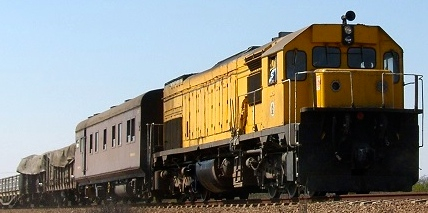Although the General Manager of the National Railways of Zimbabwe (NRZ), Respina Zinyanduko, claims the railway carrier has stabilised its operations by paying off debts and incorporating workers into its turnaround strategy, parliamentarians have urged the company to now set its sights on transportation expansion to prevent further decline.
NRZ’s strategic turnaround plan, in its first phase running from 2020 to 2024, includes achieving an operational surplus and maximizing return on assets. It also involves reengineering internal procedures for efficiency and other benefits.
During a briefing with the Parliamentary Portfolio Committee on Transport and Infrastructural Development on a visit to NRZ’s Mechanical Workshops in Bulawayo on Wednesday, Zinyanduko said NRZ has done a lot to achieve stabilization, although they have yet to achieve “one or two things.”
“We came up with this stabilization phase after realizing that NRZ was sinking,” she said. “We wanted to avoid further decline first by making sure we bring everyone on board.”
“It’s not easy to operate without salaries, so the first thing we prioritized was to ensure we cleared salary arrears for employees. We needed their cooperation for any progress.”
Zinyanduko said NRZ management cleared salary legacy debts worth US$3.8 million and brought their employees on board to avoid a situation where employees resorted to stripping the company’s assets.
“During that period, there was a culture of self-remuneration,” said the GM. “When employees come to work and don’t get paid, they find ways to compensate themselves.”
“As a result, we advised employees that going forward, we will not allow such practices because they will further sink the company.”
Due to that situation, the GM said NRZ had to address a large number of labor cases, where workers found on the wrong side of the law were dismissed or punished to protect the organization’s assets.
Financial Restructuring and Repositioning
“The whole idea was to stop the bleeding of the company and ensure we become self-sustainable even without government assistance,” she said, adding that NRZ also had to reposition its business by looking for export markets.
“We reviewed all the contracts we had to check if we were getting value for money,” Zinyanduko said. “That resulted in the termination of some contracts because many were unbeneficial and only added to NRZ’s debts.”
Zinyanduko said NRZ also cleared its pension debt, having developed a “very bad reputation” where pensioners were often paraded in the media looking desperate.
“As NRZ, we were to blame because the Pension Fund was saying we were not remitting contributions, and that debt was very huge,” she said. “We declared we would pay because today we are employees, but tomorrow we will be pensioners ourselves.”
“We also cleared the ZIMRA debt, which helped rebuild confidence among our stakeholders.”
Refurbishing Wagons and Locomotives, Seeking New Investments
In terms of wagons and locomotives, the GM said NRZ took a refurbishment approach to ensure the carriages were export-fit and acceptable on the lines of other railway administrations.
“We’ve engaged with our fellow railway administrations to address the challenges we are facing on our lines,” she said, adding that in the next three weeks, they would celebrate a small achievement on the Pachipanda-Mutare line.
“We also expect to start work on the Chikwalakwala line at the end of July. We are receiving materials then, and that will also increase our operational efficiency. So for now, we can say we have stabilized as an organization.”
Zinyanduko said currently NRZ can provide for its requirements, adding, “The ship has been stabilized.”
She added that NRZ was waiting on a bank loan from Afreximbank to acquire a new set of locomotives to replace those that are 32 years old and above.
“We have an annual assessment of the business opportunities available for rail transport and the requirements we have in terms of capacity, locomotives, wagons, and infrastructure,” Zinyanduko said.
The GM said NRZ has opportunities for business in transit traffic for Botswana, where they expect a fuel movement requirement of about 60 million litres, which would require tankers and locomotives.
Parliament Urges Focus on Expansion
Chairperson of the Parliamentary Portfolio Committee on Transport and Infrastructural Development, Knowledge Kaitano, said since NRZ has surpassed expectations by achieving stabilization, it must focus on future growth.
“NRZ has done a commendable job by stabilising itself,” he said. “Many of us didn’t know that NRZ can meet its running costs, so, in terms of stabilisation, they have been able to stabilize themselves,” he said.
“But surely we are more interested in going forward.”
Kaitano said NRZ must set its sights on transportation expansion in line with its annual plans.
“We don’t want to sit on stabilization and continue on stabilization. According to the annual work plan, from 2025 it is now another stage where we must begin to see growth. Over and above, we must begin to grow and meet the demand for transportation,” he said.

